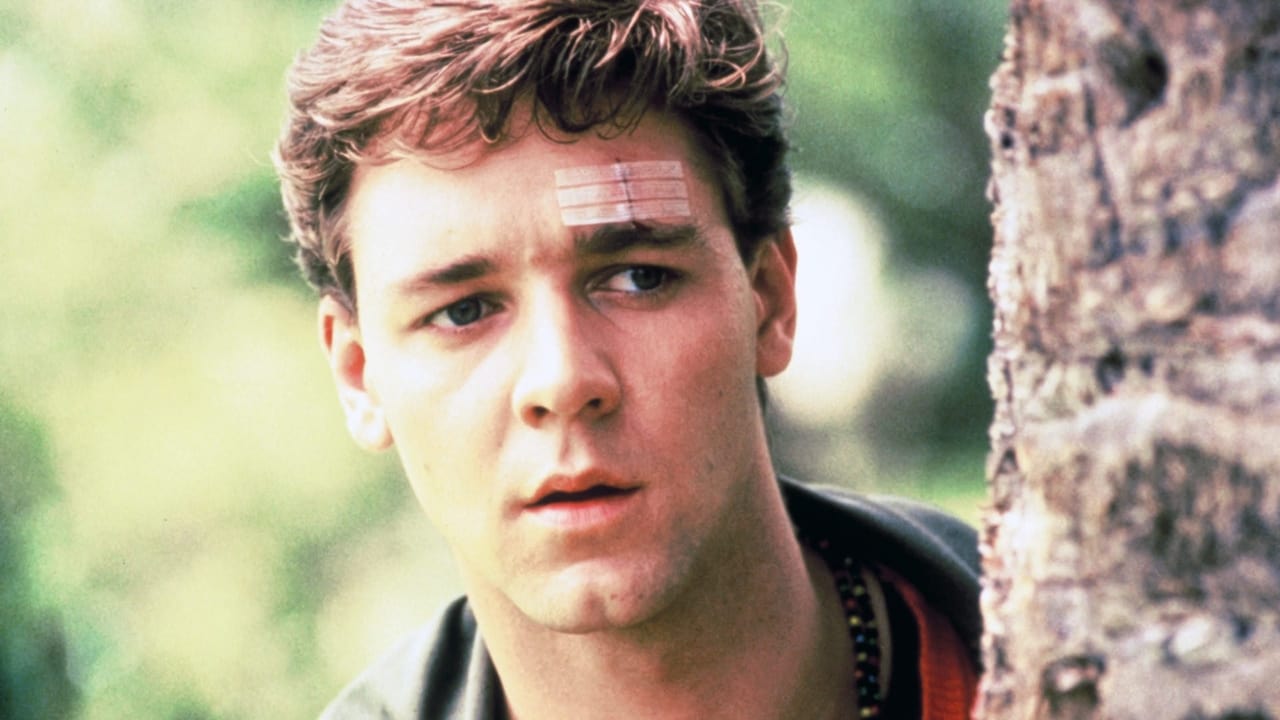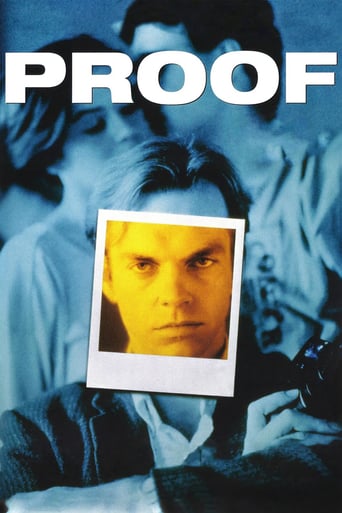



Perfectly adorable
it is the rare 'crazy' movie that actually has something to say.
View MoreThis movie feels like it was made purely to piss off people who want good shows
View MoreThere's a more than satisfactory amount of boom-boom in the movie's trim running time.
View MoreProof is a subtle drama centered around Martin, a blind man, who has a deep conviction that everyone tries to deceive him, simply because they 'can'. He has built his life around in such a way so as to not allow anyone to hurt him. He doesn't intend to trust anyone. He has a bizarre system of taking pictures and marking them in braille to be convinced that the world is as is being described to him. His maid Celia has strong feeling for him. He in fact, is specially rude to her advances so that despite his handicap, she is the weaker one in the relationship. In midst of all this comes Andy, whom Martin is able to trust and asks him to describe all the pictures he takes so that he can appropriately tag them. Celia who keeps Martin dependent on her, feels vulnerable when she sees Martin's growing trust in Andy. She manipulates Andy into doing something that shakes Martin's trust in him. Will he be able to win the trust back.It is not overly melodramatic nor is it very fast paced. It is a gripping tale where the director takes his own time to lay down the characters, revealing them only to the extent as needed to justify their actions. The chemistry between the characters is wonderful and all the three actors do a wonderful job of breathing life into their roles. Overall an enjoyable lighthearted drama with some funny moments in between.
View MoreThe story of a blind photographer is certainly an interesting one. The film doesn't show us how Martin makes a living, but he does seem to live quite a comfortable life. The reason he photographs is so he can have proof that what he thinks is out there corresponds to what people describe to him from his photos. This is what Andy mainly does at the beginning. Martin gives him photographs, and Andy describes them to him which Martin can then label. However, the flaw about this is how can Martin possible remember each photograph he takes? Either he would forget at least the majority of the pictures he takes at any day, so when he goes to develop them he wouldn't really know where they are from. Or, after he has labelled them and revisits them, how would he remember what the words mean in relation to the photograph? There is no time or place assigned to the feel or words of the label, which is especially hard to achieve without visual aids (unless he has 'photographic memory'). Weaving does a pretty good job at his character, and you can definitely get the sense of his character's dry wit. The tension between him and Celia is one I find very awkward, especially as Celia is always coming on to him. In this way, Picot does a great job with her character, depicting someone whose whole world is centred on this one person. I also enjoy the way she would randomly disrupt furniture pieces so that Martin would bump into them later. It's just so unnecessary and done out of spite that makes it laugh out loud worthy. Crowe as well does great, and his relationship with Weaving is well elaborated and depicted. There are essentially the three characters of this film, and they all interweave in each other's life in drastic ways, producing sound character development. However, the film moves at quite a slow pace, and there are countless scenes in which the characters just stare at each other in silence- or in Martin's case, sit in silence. This somewhat adds intensity to the film (dark humour), and at the same time makes it uncomfortable and awkward to watch. The story is well told, and the editing, cinematography and directing all nicely come together. The set designs - especially of Celia's apartment, tells a lot of the character. I wish there would have been more to Martin's place that could have depicted more of who his character was. His dog is cute, and its disappearance on daily walks for a few minutes is the main mystery Martin wishes to solve. Overall, the film definitely tells an interesting story, but is a little weird. I wouldn't watch it again, or outright recommend it for others to watch.
View MoreFor my Social Psychology class, my teacher showed this movie for one of our first lessons. The point of the movie was to not look at Martin, the main character, as a blind man, but as a fully capable person who was incidentally blind.Martin, the main character, is a blind man who uses a camera and pictures as his "eyes," trusting the character of Andy to faithfully describe these pictures so that Martin can "see" them. However, trust doesn't come easily to Martin, who doubts many people in his life including his housekeeper, Celia, who is madly in love with him, and even his own Mother, who through flashbacks we see was never really trusted. Martin giving his trust to Andy, someone he barely knows, makes Celia angry and sets off a chain of events.The story evolves from there, each scene an important piece of the puzzle (which is refreshing, no scenes are put there just to be there). The main theme of this movie is the element of trust, which Martin seems to lack, Andy seems eager to give, and Celia wants to receive. Looking at Martin as a person, not as a blind man, makes this movie all the more rich. Martin is easily related to - Trusting someone and expecting honesty is something we all want. Similarly, Martin wants control of his life (and is by all means capable of it), but he still has that element of vulnerability, despite how much he tries to deny it. Martin must also accept the fact that people are not always perfect. They lie sometimes, and sometimes that's okay. All in all, this movie is amazingly crafted, well written, and funny.
View MoreThis deliciously enticing bit of cinema from Down Under revolves around the activities of three people: A mistrustful blind man, a desperate, love-hungry woman, a misguided young man, and what happens when these three paths intersect.Martin is a misanthropic blind man, whose unshakable mistrust of humanity compels him to compulsively take photographs of everything around him. So deeply-rooted is his paranoia that he believes his own mother rejected him because of his handicap, and so deceived him in her descriptions of the world. Martin took a picture--his first--of a garden his mother customarily described to him, as evidence that she had lied.Martin's paranoia that anyone might be lying to him has shaped the rest of his life, growing up to become uncompromising and fiercely independent. He behaves callously in his only human interaction--with his rancorous housekeeper, Celia. Celia is obsessively, possessively in love with Martin. But their relationship is a prickly one, marked with cruelty and malice on both parts. Martin, aware of Celia's desire for him, uses the knowledge as a weapon--tormenting her by keeping her on, but rebuffing her attempts. In return, Celia spitefully rearranges the furniture so Martin will run into it and exploits his dependency on her to boost her own ego.Years later, Martin is still a photographer, but now he wants someone he can trust to describe his first photo to him, thus giving him the 'proof' of a long-dead mother's love.This someone happens to be Andy, a dishwasher at a local restaurant. But when Andy threatens to become too great an influence in Martin's life, Celia, feeling her territory has been violated, sets out to discredit Andy--using her sexuality to control both men."Proof" could all so easily have slipped into melodramatic theatrics, but the film skips nimbly along the line, managing to evade all potential traps. Most of the credit is due to the adroit, agile script and the outstanding performances from the cast.Jocelyn Moorhouse, the film's director and writer, has the innate gift of comprehending, capturing, and conveying the human condition so aptly, so that the audience is deftly drawn into these characters' lives. The film doesn't rely on a contrived plot to induce interest; these ordinary characters are intrinsically fascinating simply because of who they are.The acting is superb, making for a fabulous ensemble piece. Hugo Weaving renders a thoughtful performance as Martin, convincingly portraying a man who has closed himself off so effectively against the possibility that he might get hurt, that he has cut off the possibility of feeling. Genevieve Picot is likewise excellent, marvelously calculating, yet vulnerable as Celia. And Russel Crowe radiates an already unmistakable and irresistible charisma on-screen in this early role as Andy. His easy-going, honest, bloke-next-door charm is utterly appealing--a far cry from later roles in "L.A. Confidential" and "Gladiator", showing his incredible acting range.This diabolically clever, enormously witty, and refreshingly original film can be hilariously funny at some times, genuinely heart-rending at others, and an all-round brilliant bit of cinema. Well-worth a look.
View More